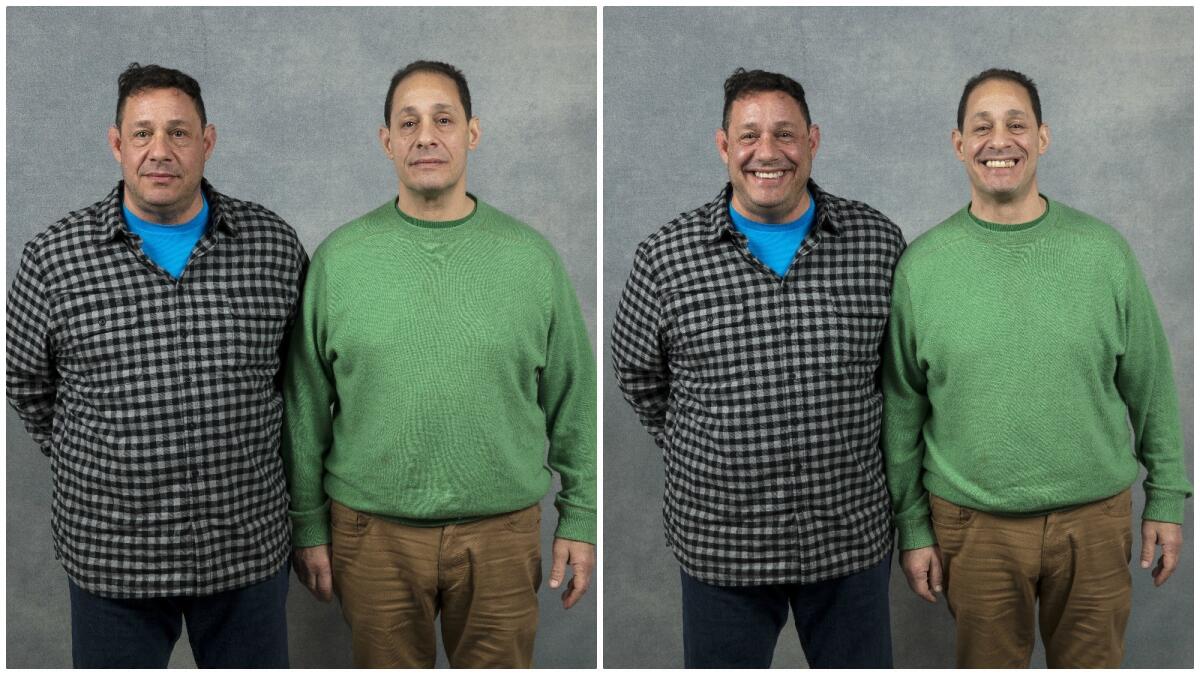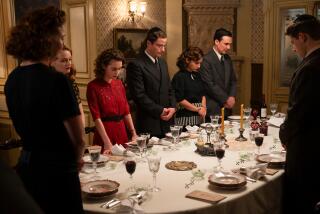The surreal, sad story behind the acclaimed new doc ‘Three Identical Strangers’
When they were first reunited at age 19, the triplets quickly discovered how much they shared in common. Though they’d been separated at birth, David Kellman, Bobby Shafran and Eddy Galland had all individually grown up loving many of the same things: Marlboro cigarettes, wrestling, the same type of woman.
Decades later, at 56, the brothers are still learning about their commonalities. As boys, Kellman and Shafran shared the same vision problem: Amblyopia, a condition in which the brain and eye are out of sync, resulting in a lazy eye. But only Kellman was treated for the ailment — a fact that infuriates the siblings.
The brothers have spent the past few years, in fact, working through rage — anger toward the fate that befell them. What began as a miraculous fairy tale — three long-lost brothers stumble upon one another through sheer happenstance! — has since devolved into a dark tale of deception and inhumanity. It’s the story at the heart of “Three Identical Strangers,” a just-released documentary that premiered to jaw-on-the-floor reviews at the Sundance Film Festival in January. (It debuted to impressive ticket sales in its very limited release over the weekend.)
The movie, directed by British filmmaker Tim Wardle, tracks how the triplets randomly found one another in 1980 and instantly became media darlings. They were interviewed by Tom Brokaw and Phil Donahue, wearing matching outfits and answering questions eerily in sync. The trio formed a bond so fast that it was almost as if they hadn’t been raised by three different adoptive families. They moved into an apartment together in New York City, later opening a SoHo restaurant called — what else? — Triplet’s, which attracted scores of tourists.
Slowly, however, the bloom came off the rose. In 1995, after a struggle with mental illness, Galland committed suicide. That same year, Pulitzer Prize-winning journalist Lawrence Wright published an article in the New Yorker shedding light on a disturbing psychological study. The scientific inquiry, masterminded by prominent psychologist Dr. Peter Neubauer and his Child Development Center, set out to answer the fundamental question of nature vs. nurture. Through the now-defunct Louise Wise adoption agency, an unknown number of twins and triplets were placed in different homes and secretly observed for years by researchers who diligently made home visits. (Parents were told these visits were standard, to track the adoptive children’s progress.)
Kellman, Shafran and Galland were part of the study, each strategically placed in a blue-collar, middle-class and wealthy home. The disclosure is at the crux of “Three Identical Strangers,” which unfolds like a thrilling, macabre mystery.
“It’s beyond anger,” Shafran said, describing his emotional state after the revelation came to light. “We’ve been called ‘subjects.’ We’re victims. There’s a big difference. I don’t want to play off like we’re horribly injured people now as adults — we have families, we have children — we’re relatively normal people. But they treated us like lab rats. Nothing more. And we’re human beings.”
He was sitting with his brother, Kellman, and the film’s director in Park City, Utah, earlier this year, a few hours after the documentary had first played for the public. The experience, the siblings said, had been moving. Kellman heard many audience members crying, and said a number of people approached him post-screening to offer him hugs.
“A couple came over to us and said, ‘On behalf of all the research psychologists in the world, we’re sorry,’” he recalled.

Though the festival experience proved cathartic, both brothers were extremely hesitant about partaking in the documentary; it took four years for Wardle to convince them to participate.
“If you see what’s happened to these guys in their lives, it’s not surprising that they’re initially wary when people approach them,” said the filmmaker. “We’re British people coming in and saying ‘We want to tell your life story.’ And they’ve been messed around a lot by the media. I would be suspicious of people.”
Kellman agrees: “After all this time, they were so excited about our story and we wondered what they really had in mind.”
A teaser Wardle created to help raise additional funding for the project early on didn’t help. When the brothers saw it, they had second thoughts about moving forward. Even Wardle acknowledges that the sizzle reel was “quite tabloid” and “a bit sensationalist” for selling purposes.
“For every talk show we were on, every snapshot we were promised — no one ever sent us anything. It felt like everyone was making money on us but us,” Shafran said. “This wasn’t about money — it was just that if we were going to tell our story, we wanted to tell it truthfully.”
Despite the teaser misstep, Kellman said he and his brother decided to take a “leap of faith” and move forward with Wardle. And as a result of their participation in the film, a slew of new information has come to light. Because of the filmmaking team’s persistence, thousands of pages from the Neubauer study have been released to the brothers.
When Neubauer died in 2008, he went to his grave having never spoken publicly about his findings. He left his research at Yale University, where it is to be sealed until 2065 — presumably so that any subject of his study would be dead before they could access it.
Access to the papers at Yale is controlled by the Jewish Board of Family and Children’s Services. An earlier incarnation of the 150-year-old nonprofit was called the Jewish Board of Guardians, and that organization was one of two that helped establish Neubauer’s Child Development Center in 1947.
In a statement, a spokesperson for the Jewish Board said the group does “not endorse the Neubauer study, and we deeply regret that it took place. We recognize the great courage of the individuals who participated in the film, and we are appreciative that this film has created an opportunity for a public discourse about the study. For many years, The Jewish Board has been, and will continue to be, committed to providing people who were involved with the Neubauer study access to their records in a timely and transparent manner.”
Indeed, after Wardle got involved, The Jewish Board did give Kellman and Shafran access to about 10,000 pages from the study. There were some interesting findings — such as the Amblyopia revelation — but most of the pages were heavily redacted and none reported formal conclusions.
“The data was collected but the results were never published, and we’re getting to a point where we’re pretty sure that nothing was ever done with it,” said Shafran, a lawyer who lives in Brooklyn with his wife and two children. “And then what was the whole point of this, right? All this observation, collecting all this data, and no conclusions?”
When the brothers initially learned about the study, they consulted an attorney but were told that the statute of limitations might prove to be an issue in the case. Shafran found the explanation ludicrous: “It’s not like someone left a scalpel in someone’s belly button. How many cases like this do you have to compare it to? What they did to us wasn’t a question of law. These people were entrusted with God-like power and decisions.”
Since “Three Identical Strangers” — which will air on CNN in early 2019 — Kellman and Shafran have begun to reconsider their legal options.
Though their participation in the documentary has led to the stirring of painful memories, it has also led to tangible movement in the case. And it’s given the two brothers “a reason to spend more time together and work harder on our relationship,” said Kellman, who lives in New Jersey with his wife and two children and works as an insurance agent.
Wardle said he was extremely cognizant of the effect his movie could have on the brothers.
“Because of their background, it threw up a lot of ethical considerations for us,” he admitted. “Normally on a documentary like this when people are talking about painful memories from their past, we would probably expect them to speak to a psychologist beforehand and have a talk and make sure they were comfortable and happy with it. And we offered them that. But it’s their decision whether they take it up or not. We’re certainly not going to press it on them, because they’ve been through quite a hard time psychologically.”
Shafran shook his head and offered a nervous laugh.
“I mean,” he said, “how little could they do for someone like me?”
Follow me on Twitter @AmyKinLA
More to Read
Only good movies
Get the Indie Focus newsletter, Mark Olsen's weekly guide to the world of cinema.
You may occasionally receive promotional content from the Los Angeles Times.







